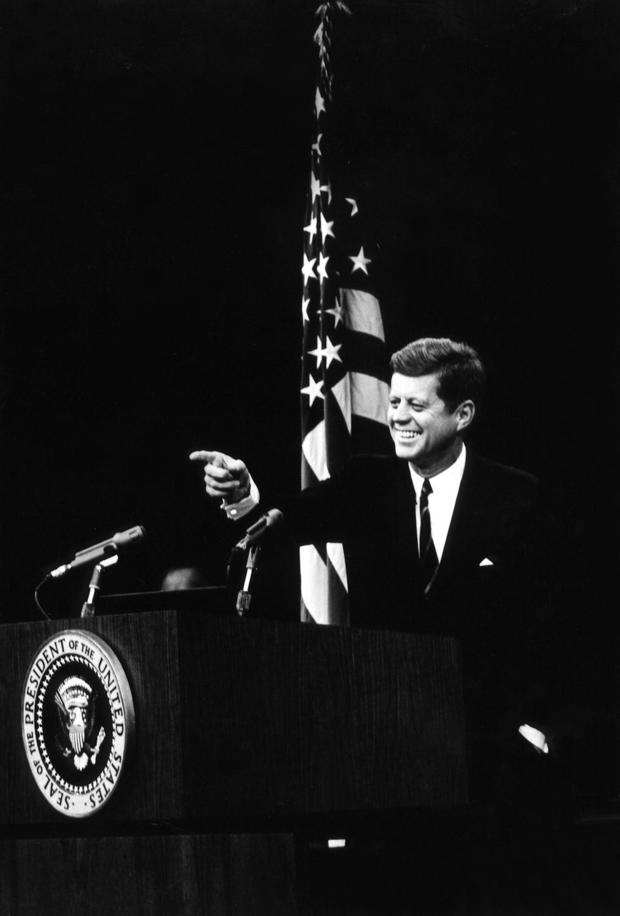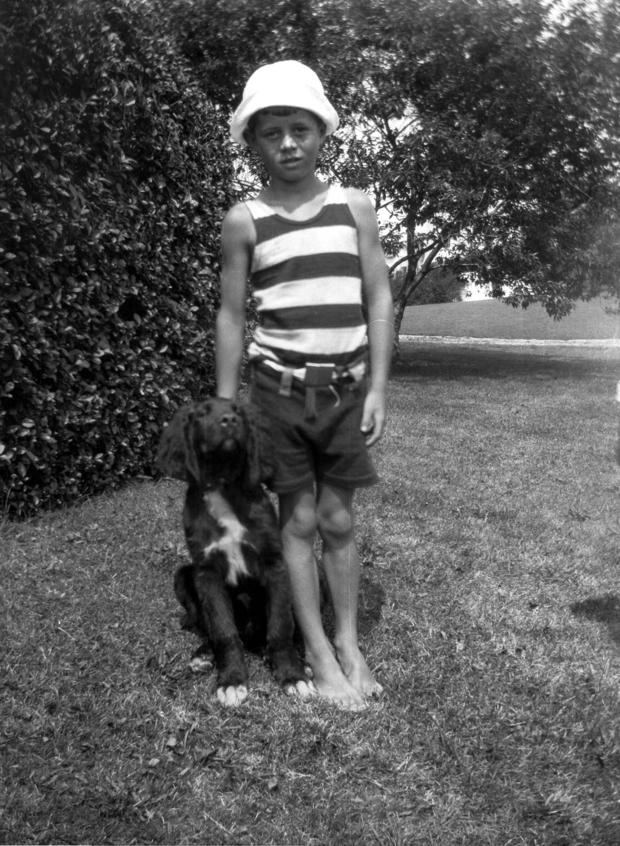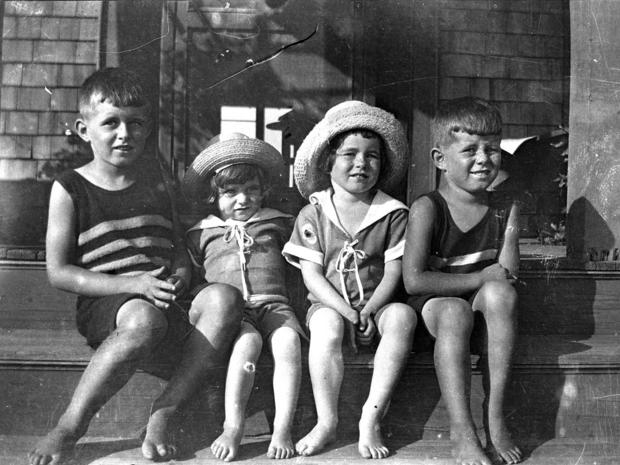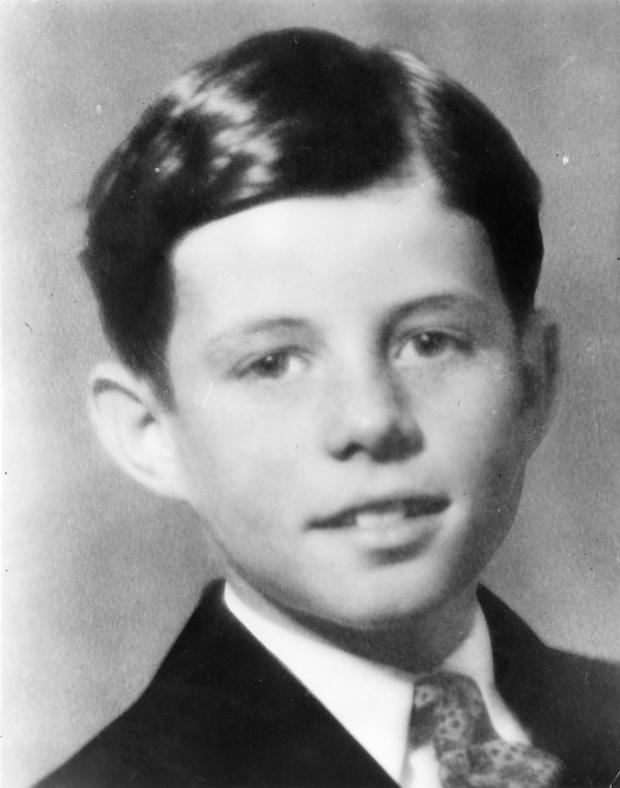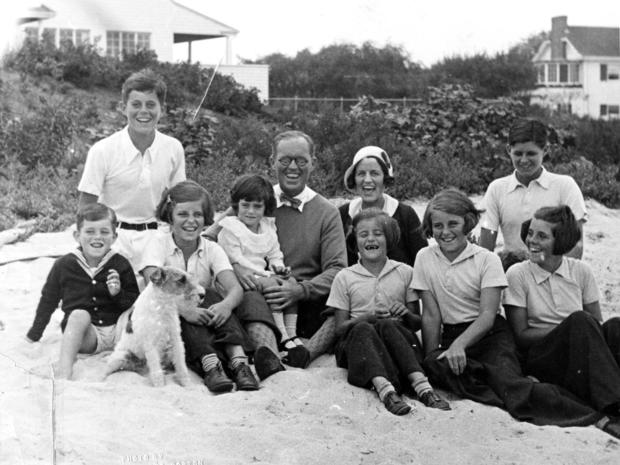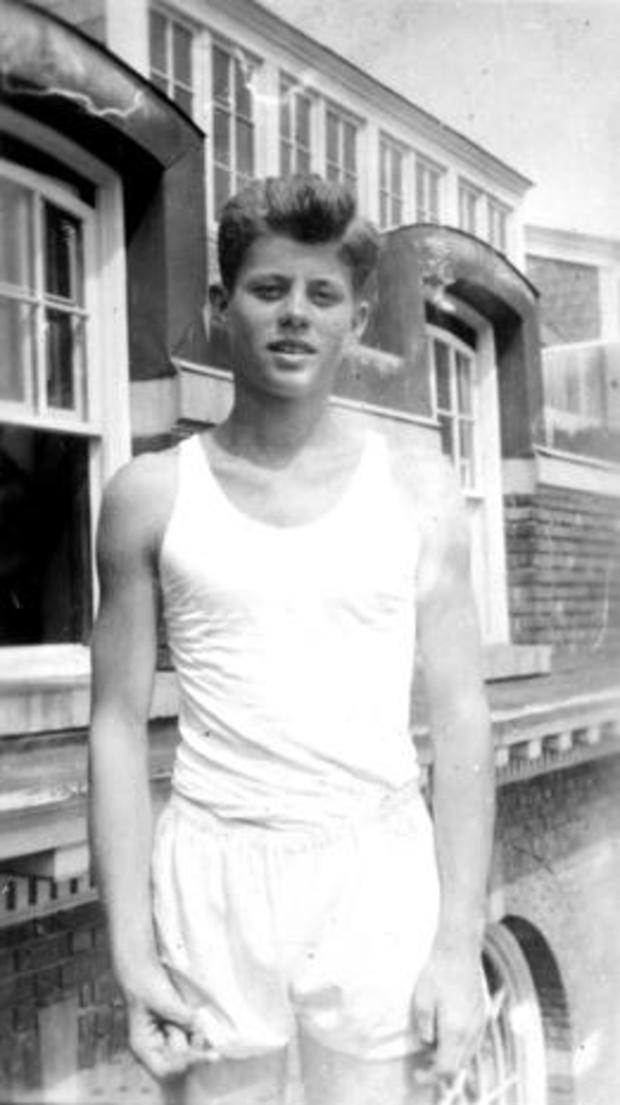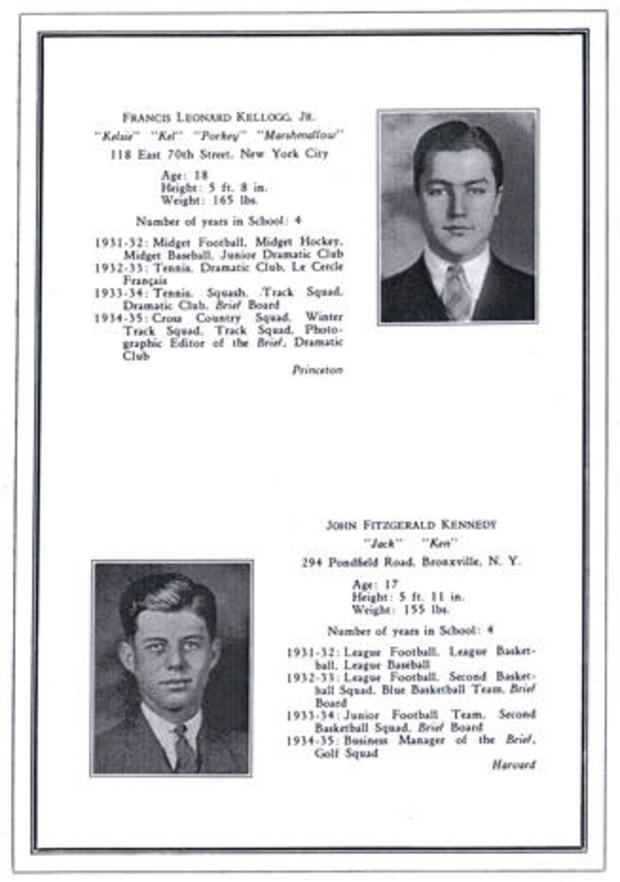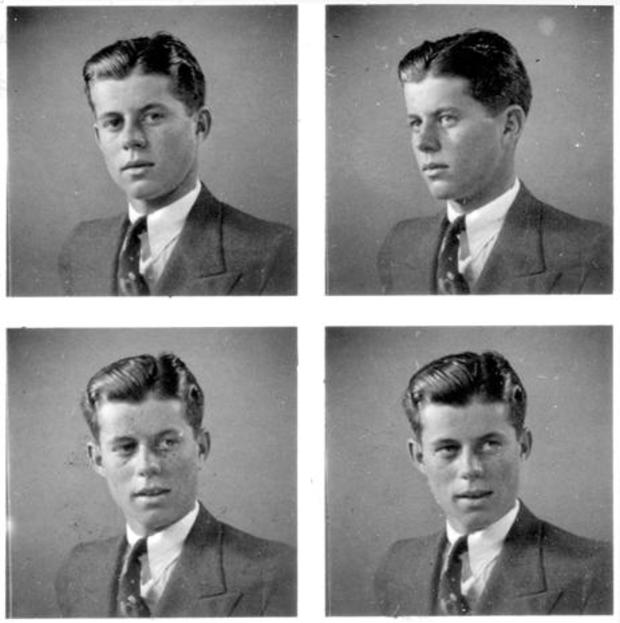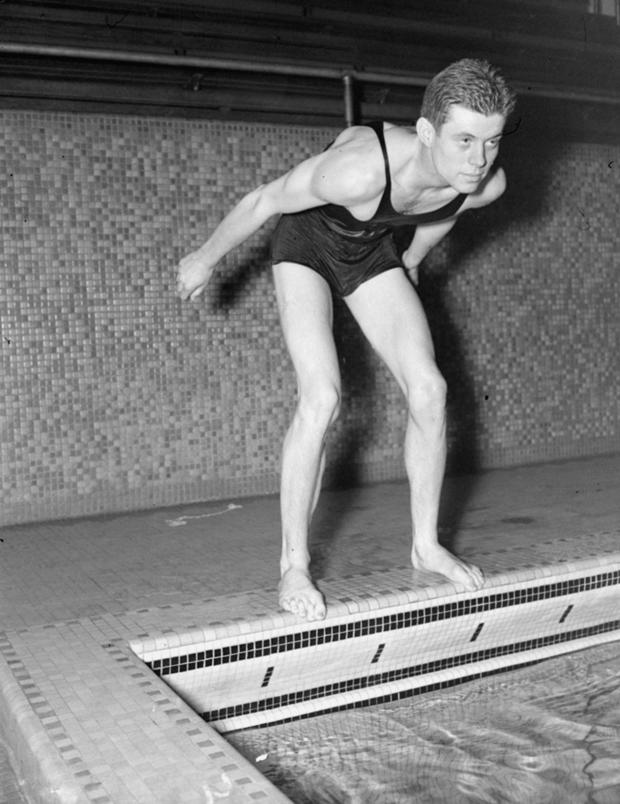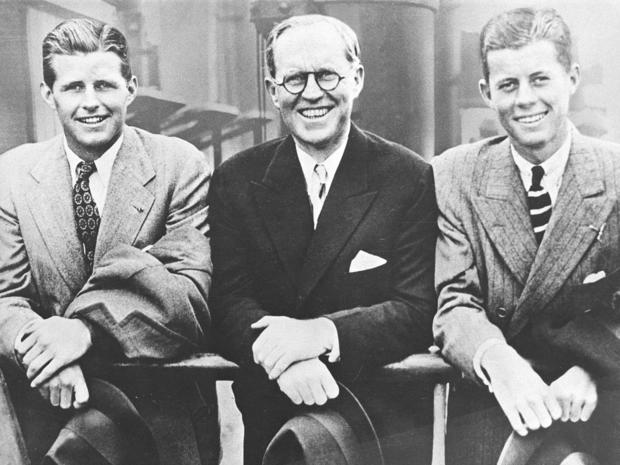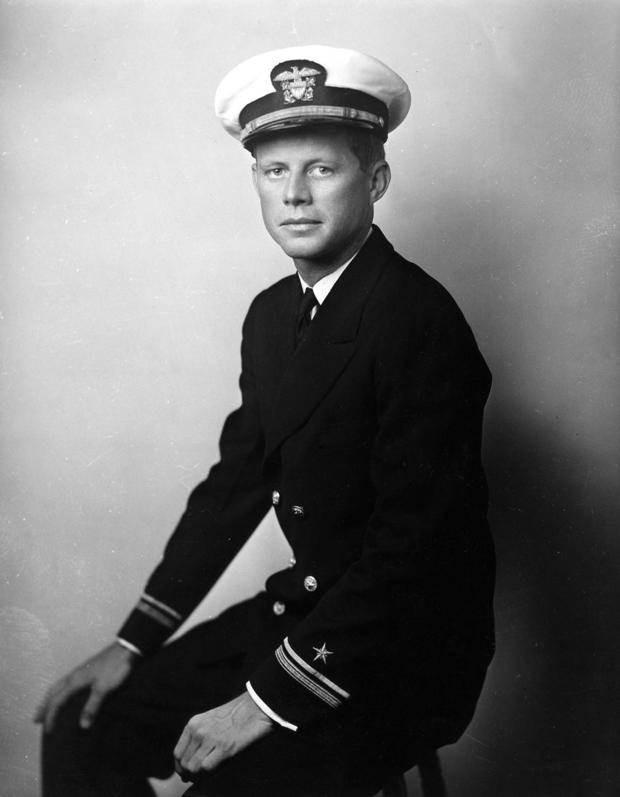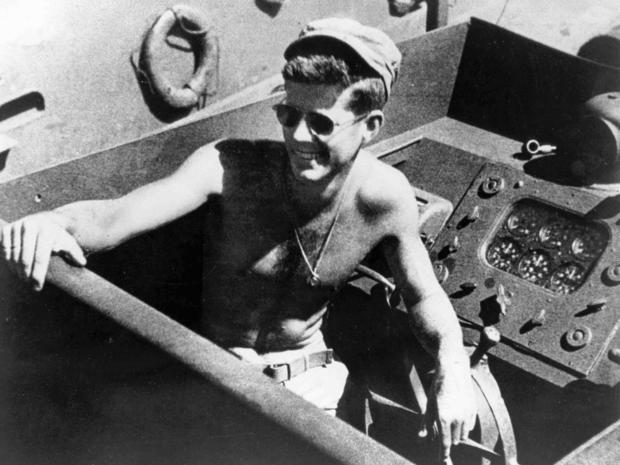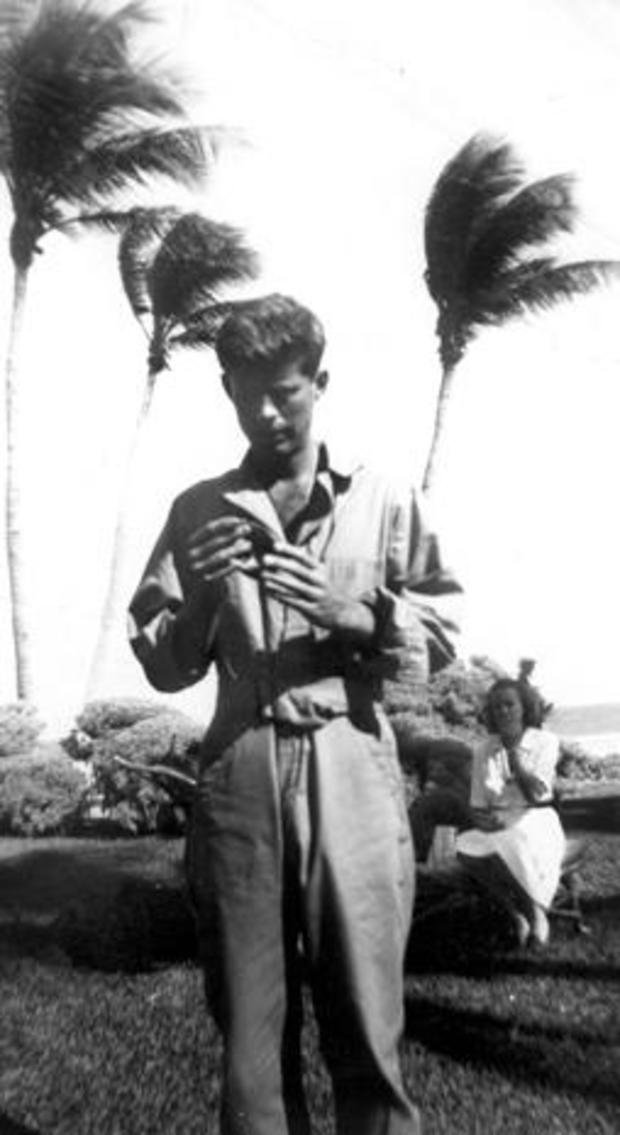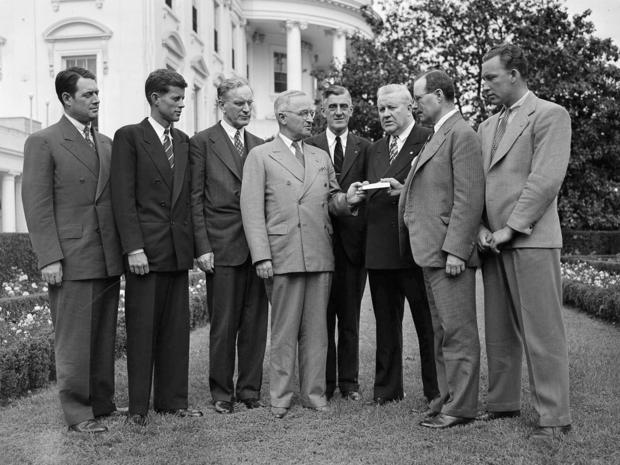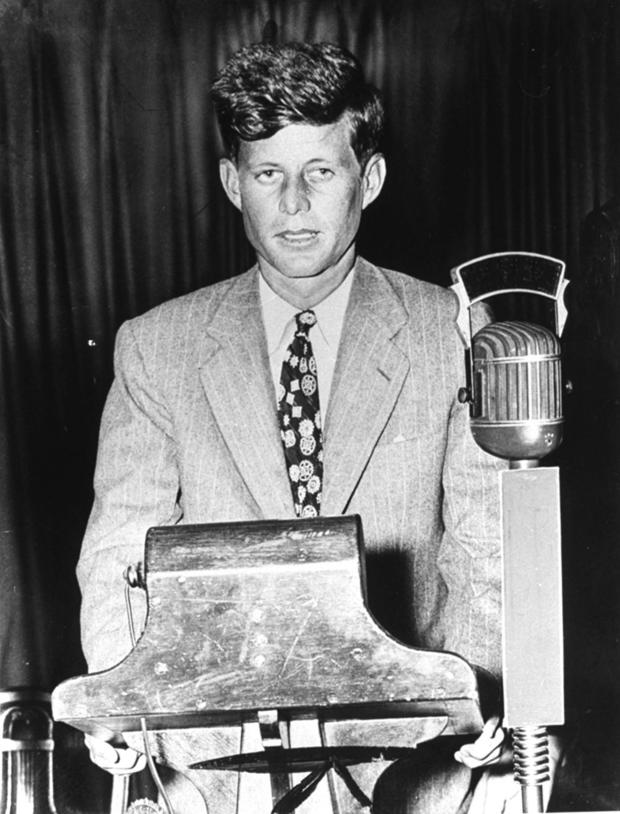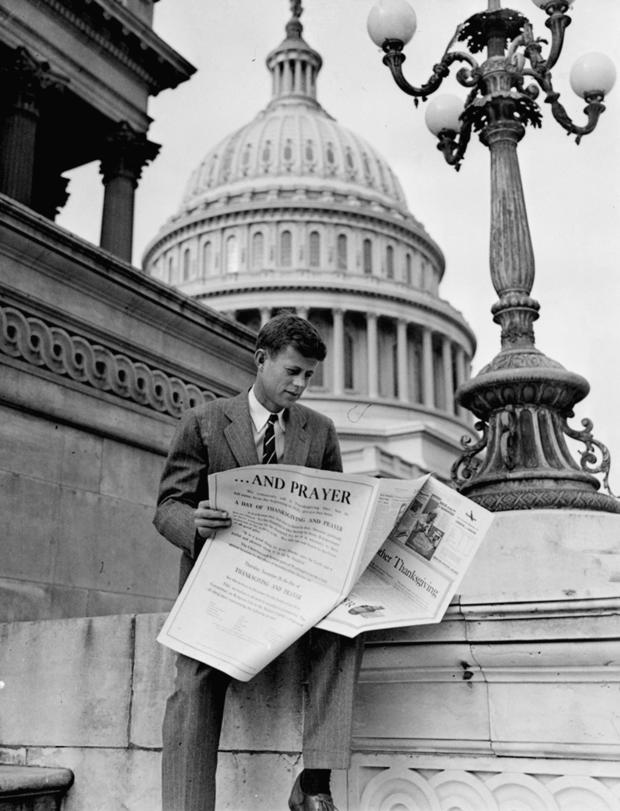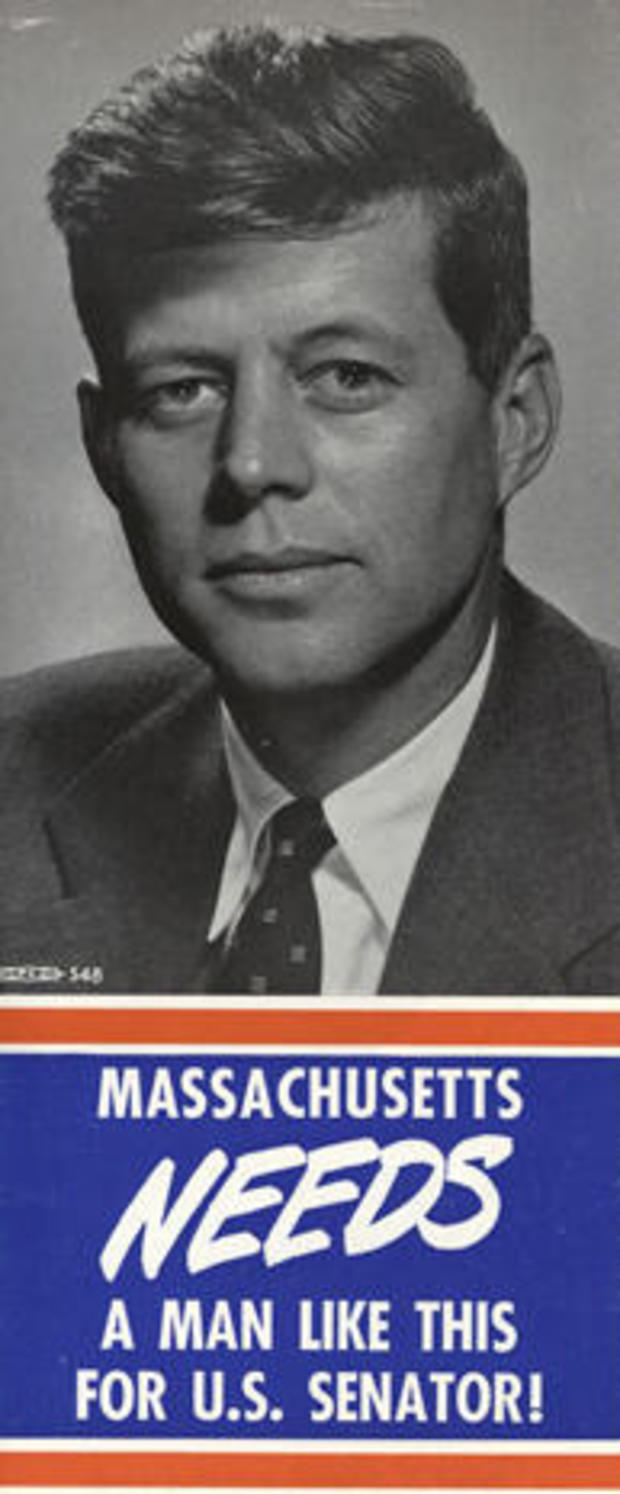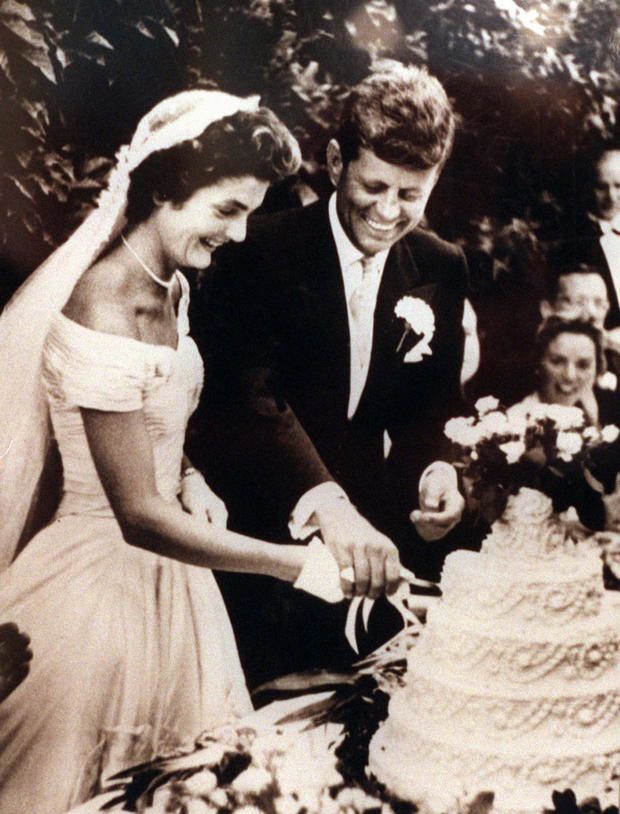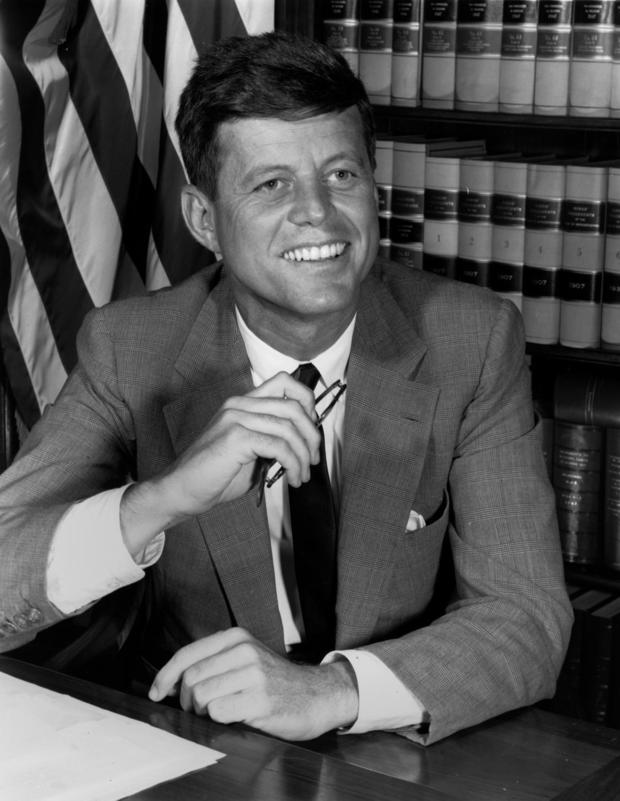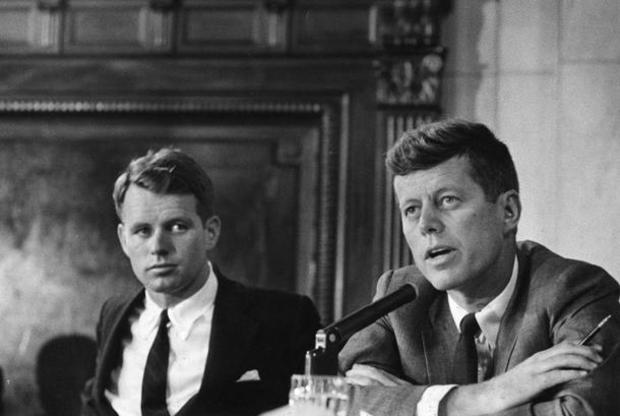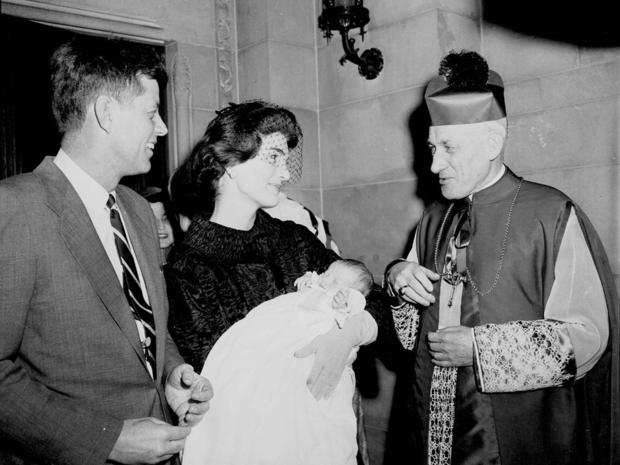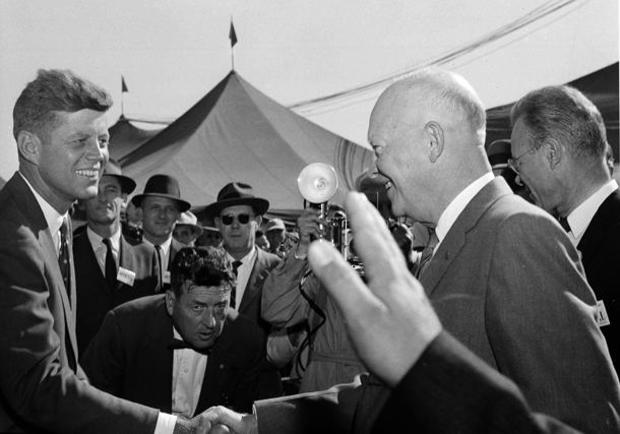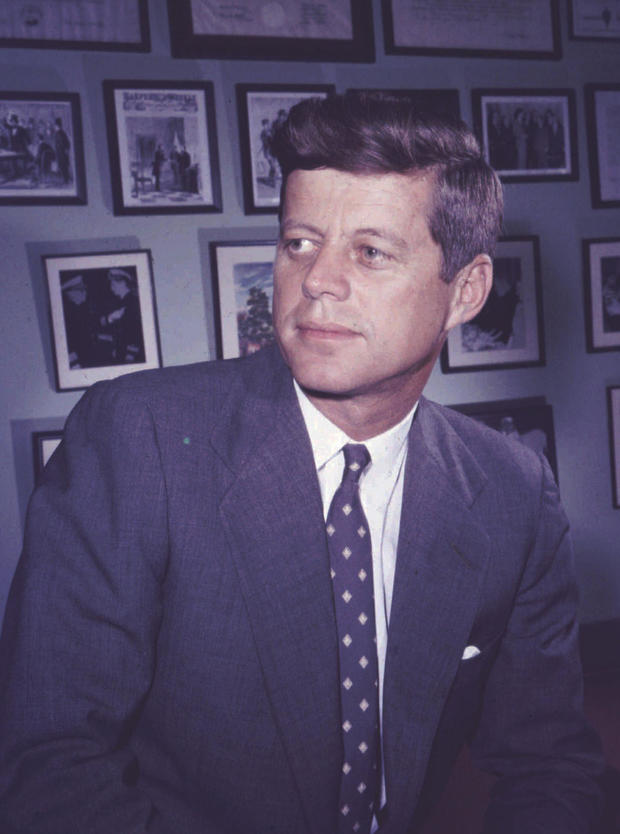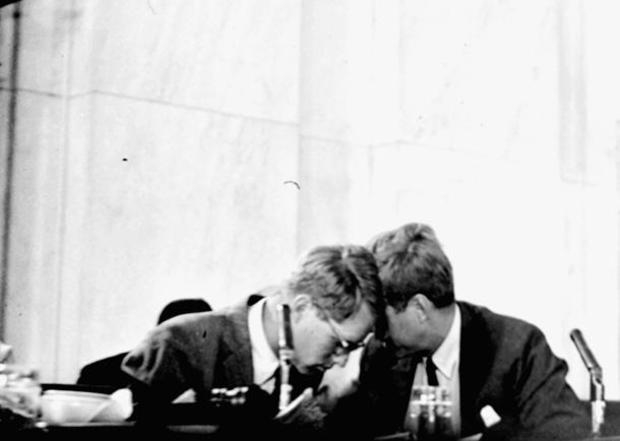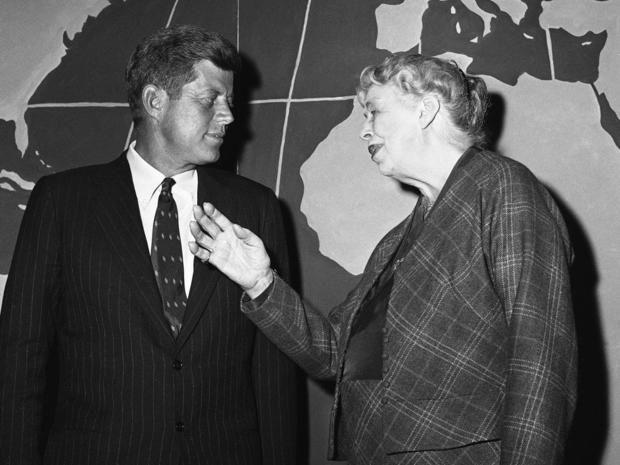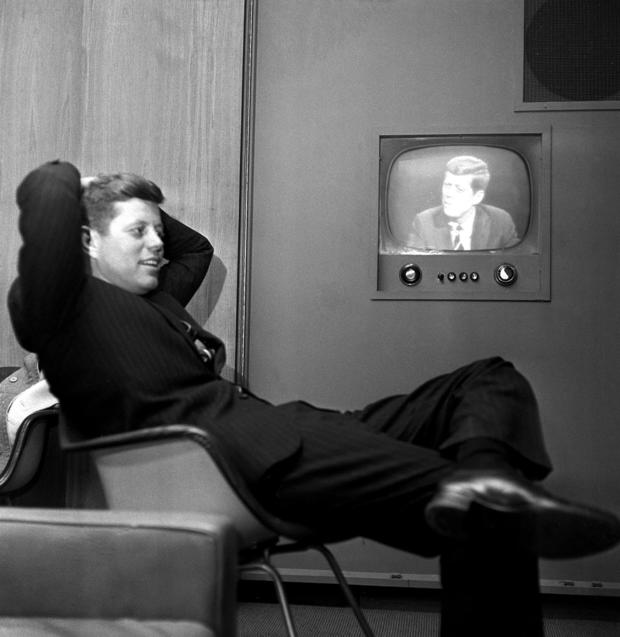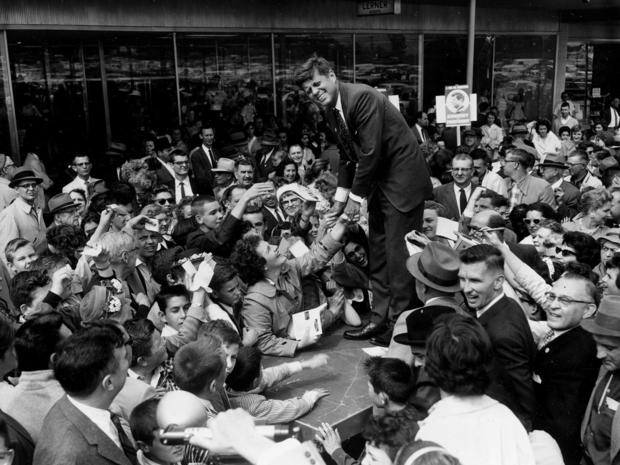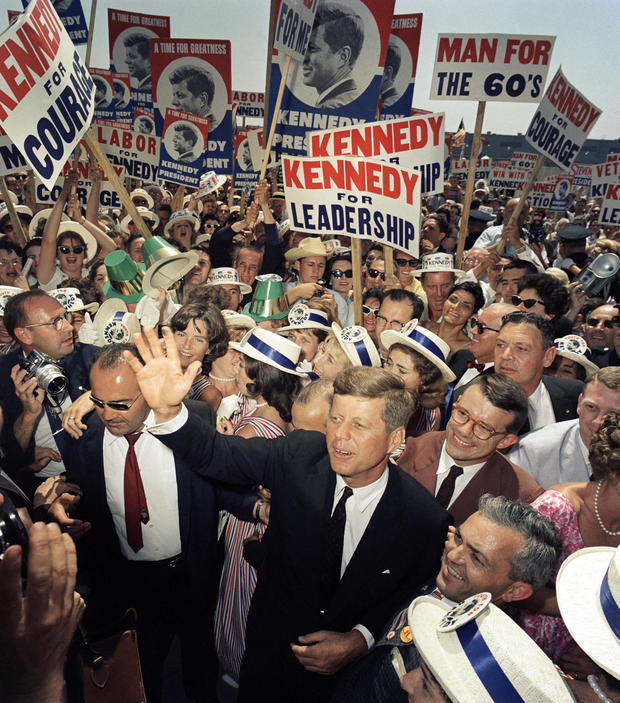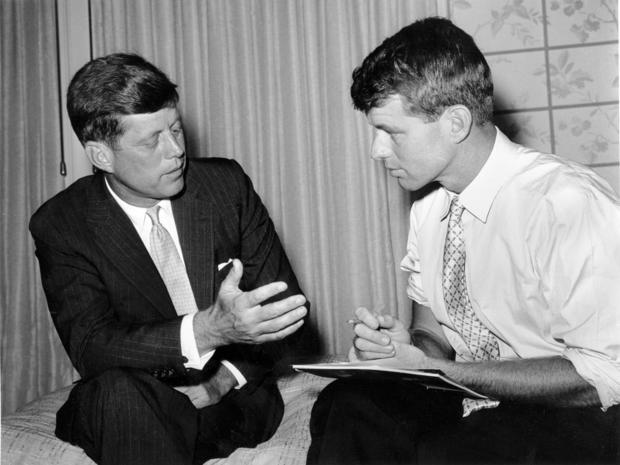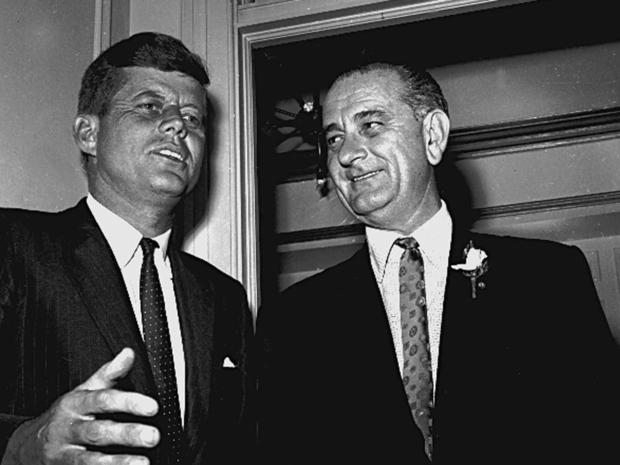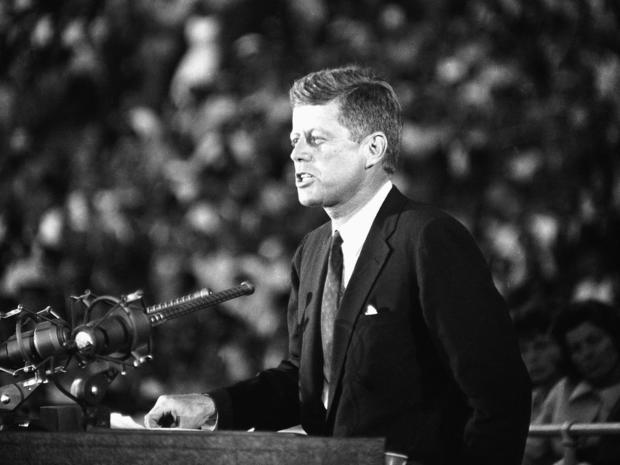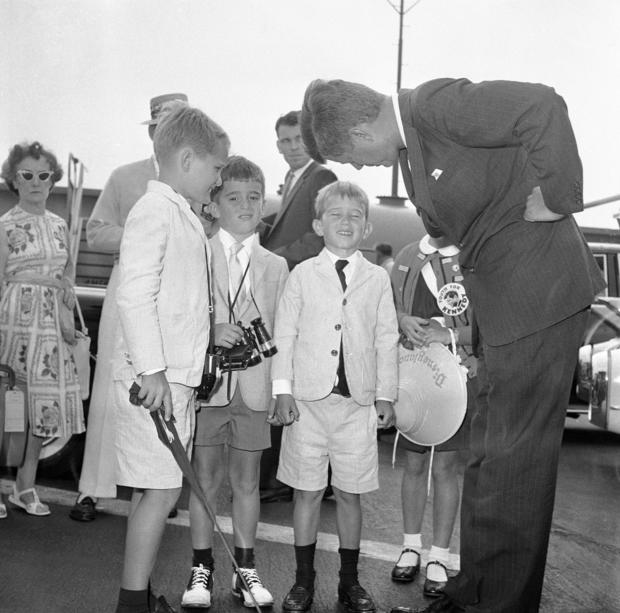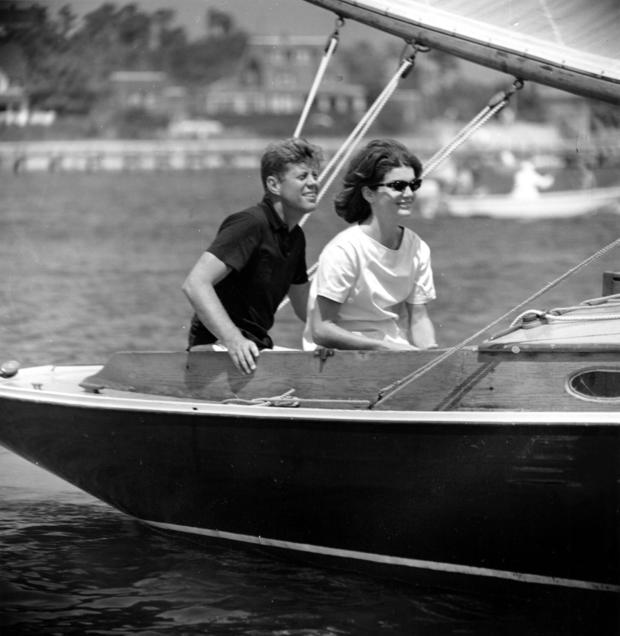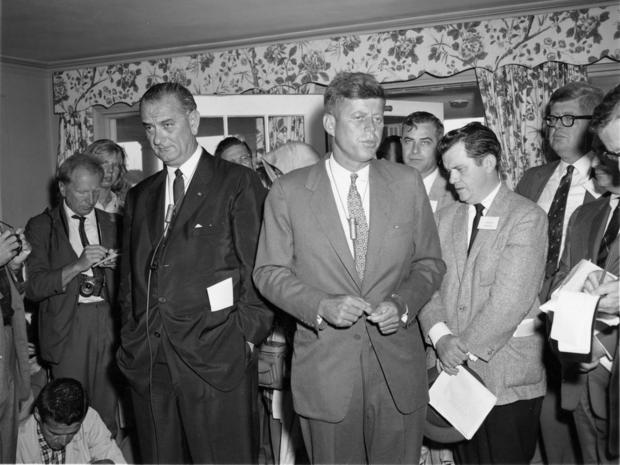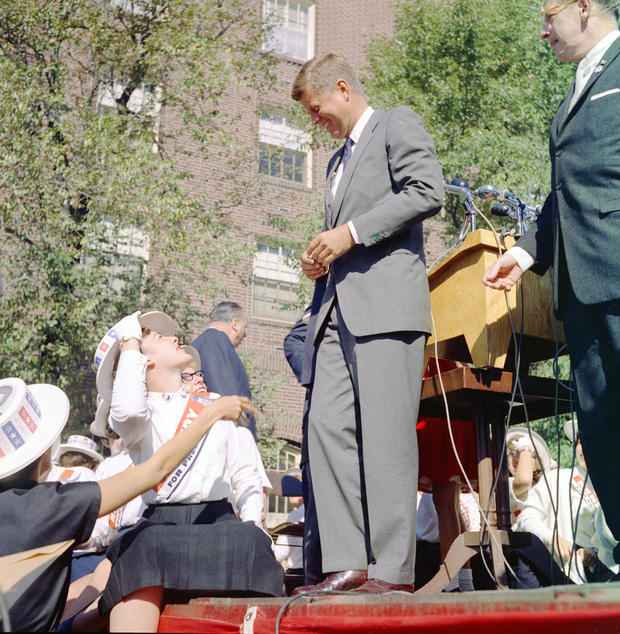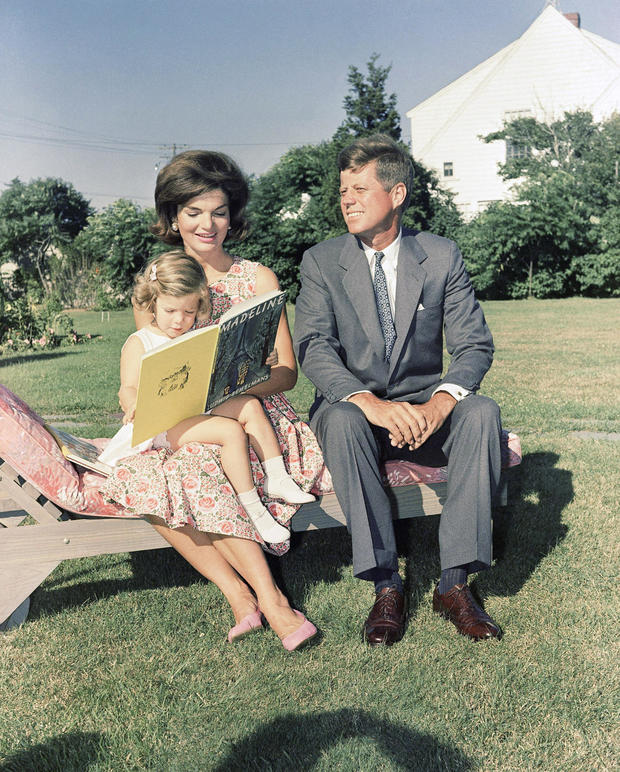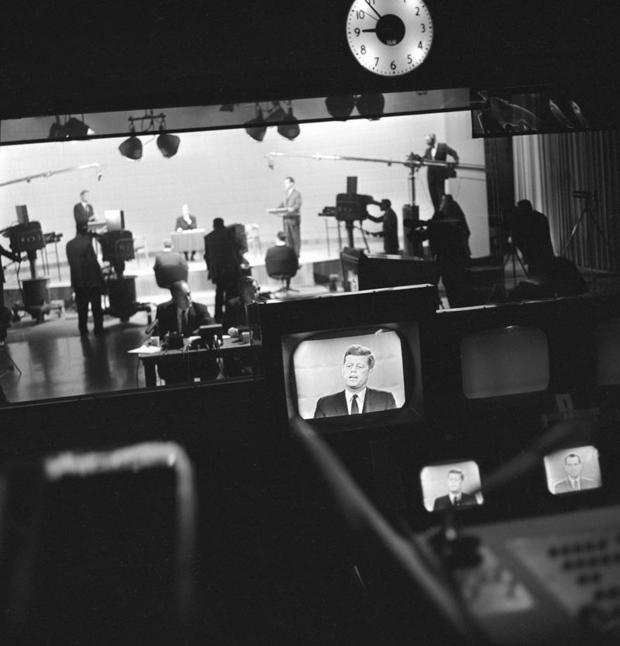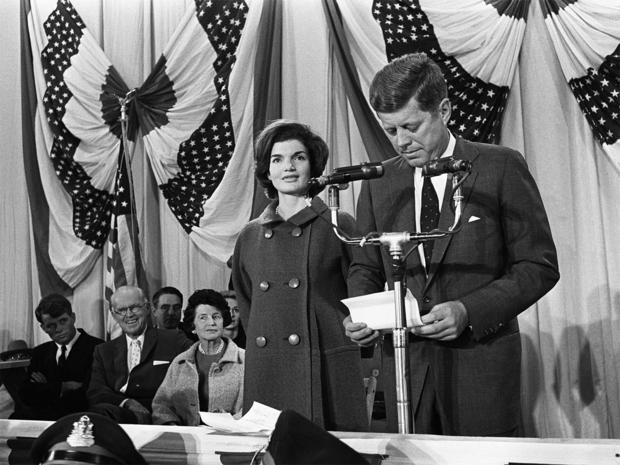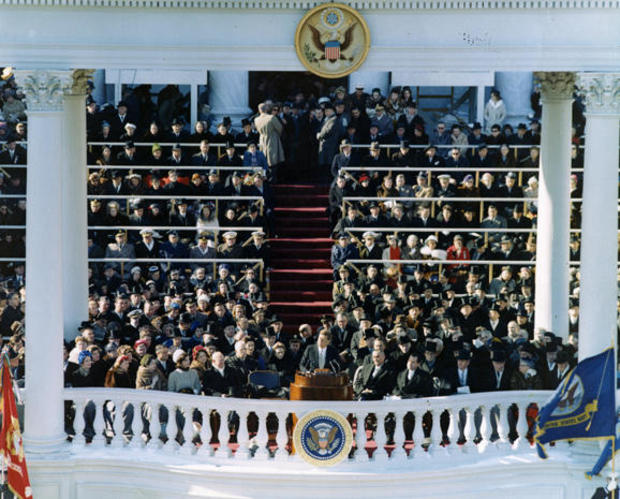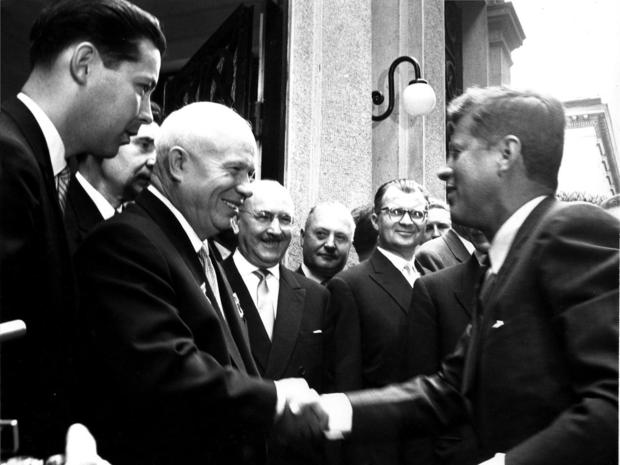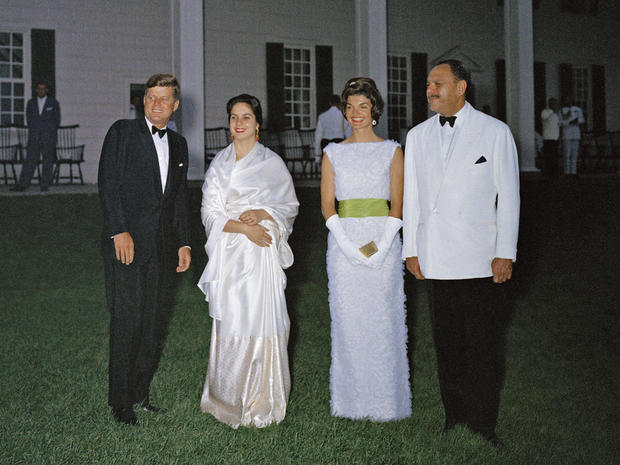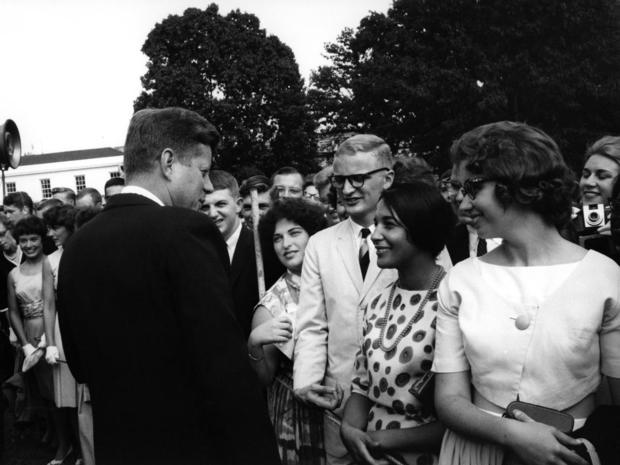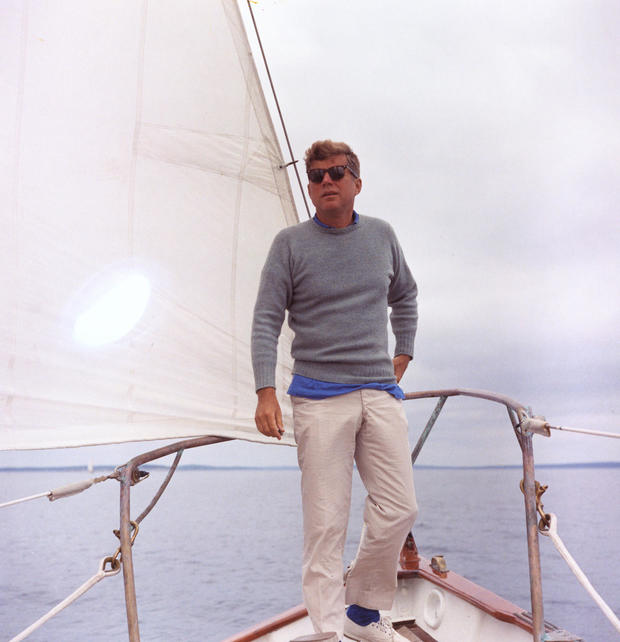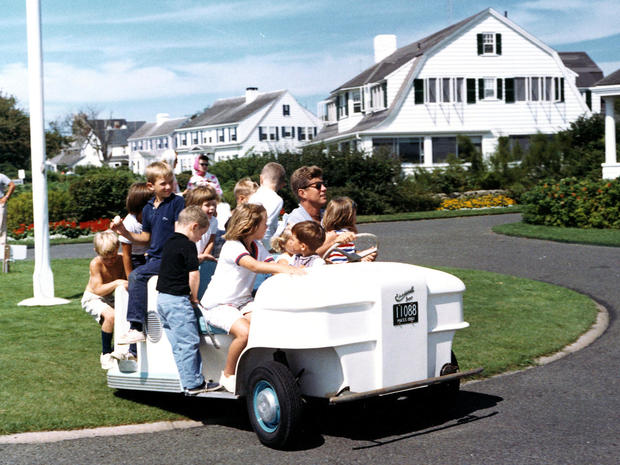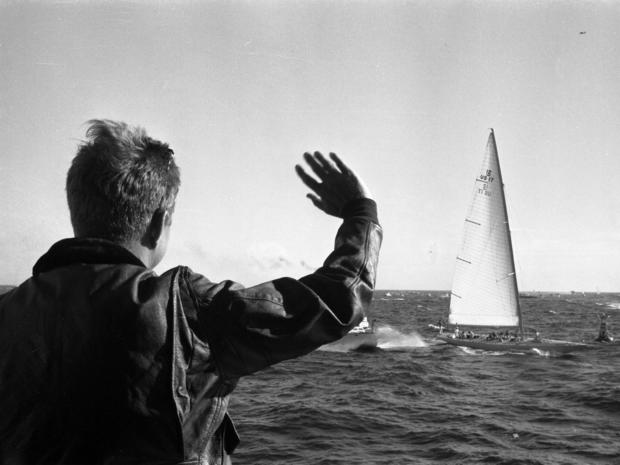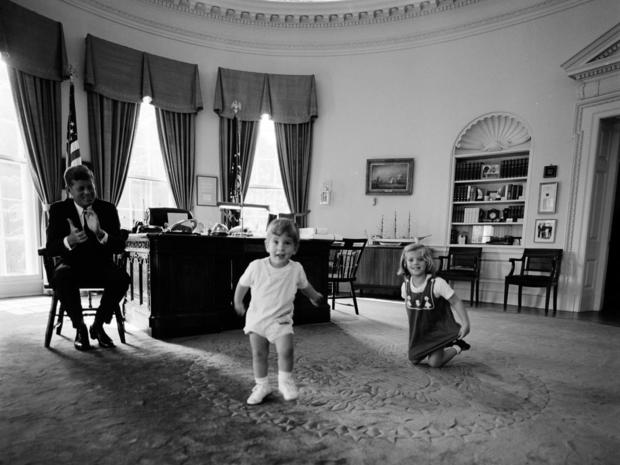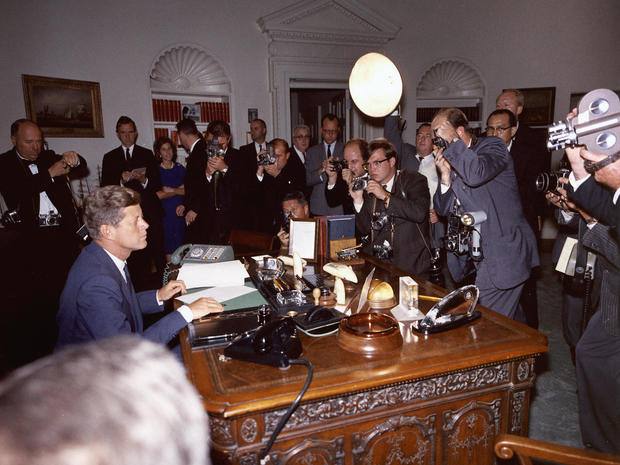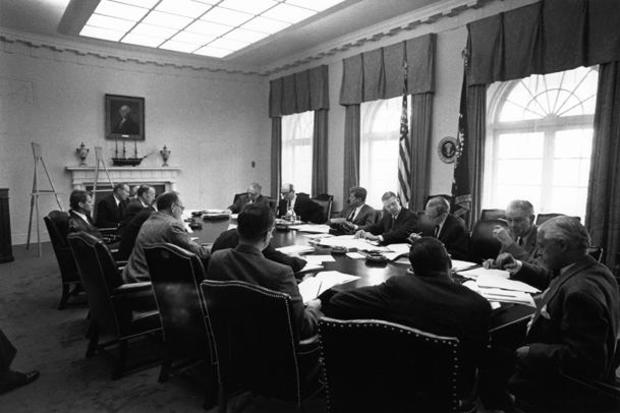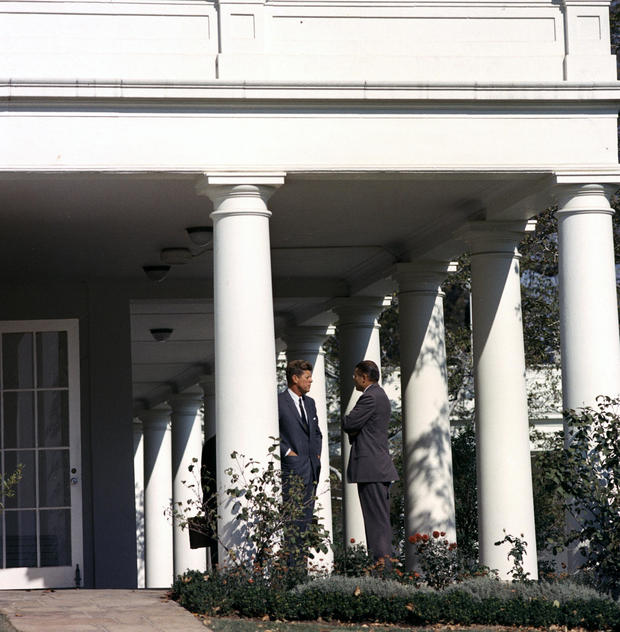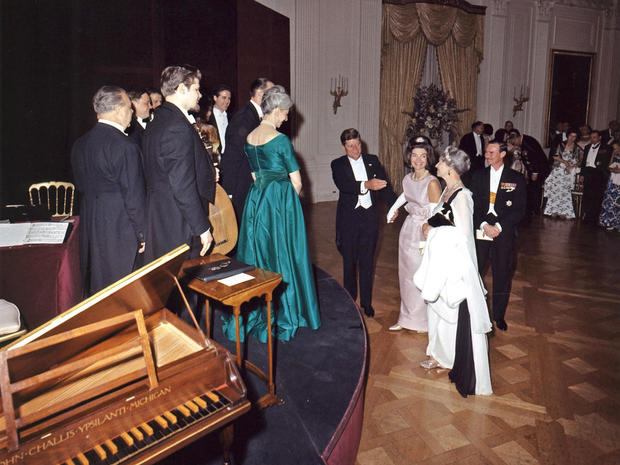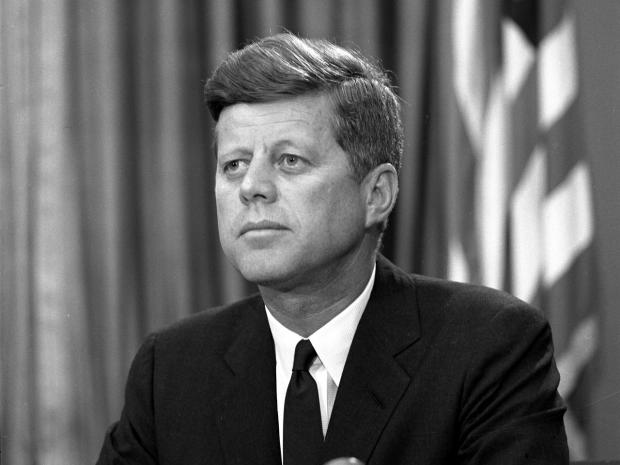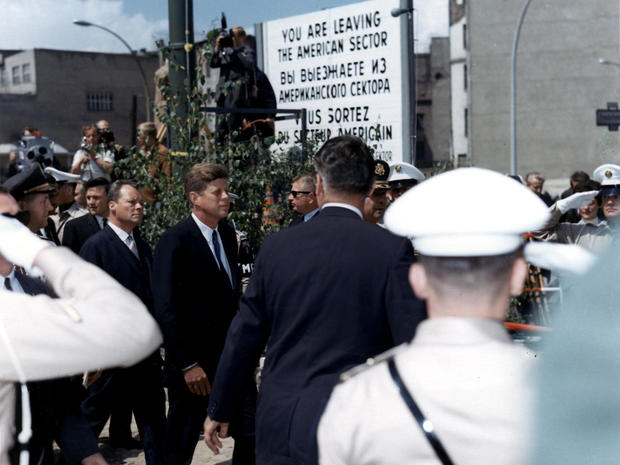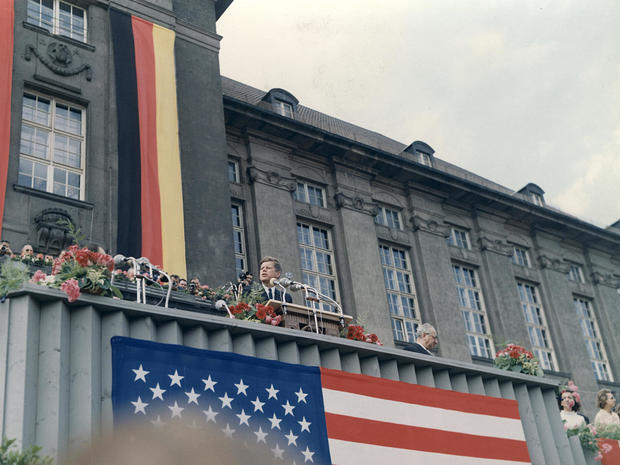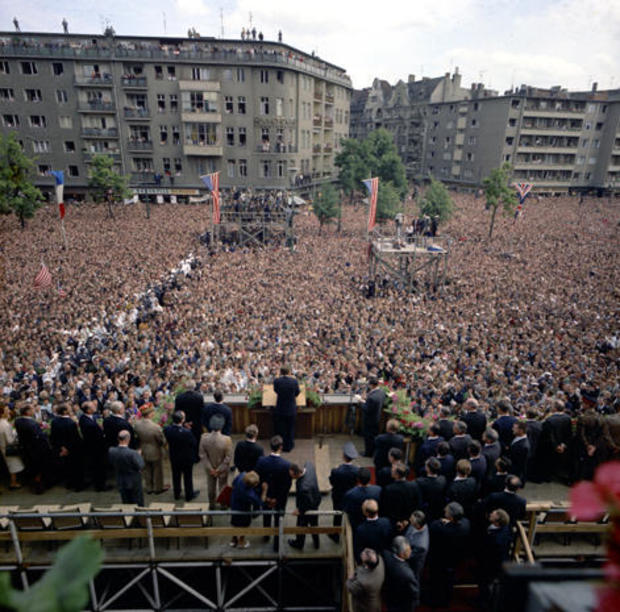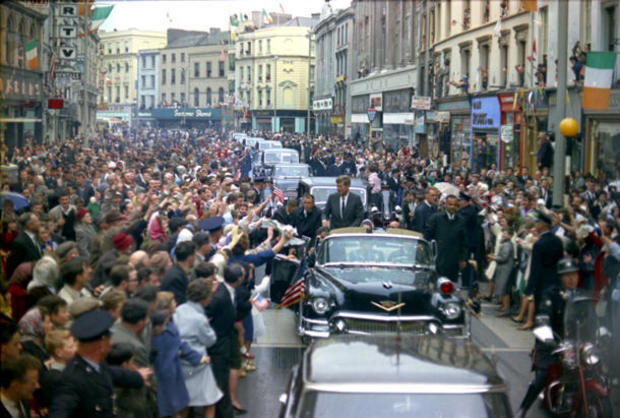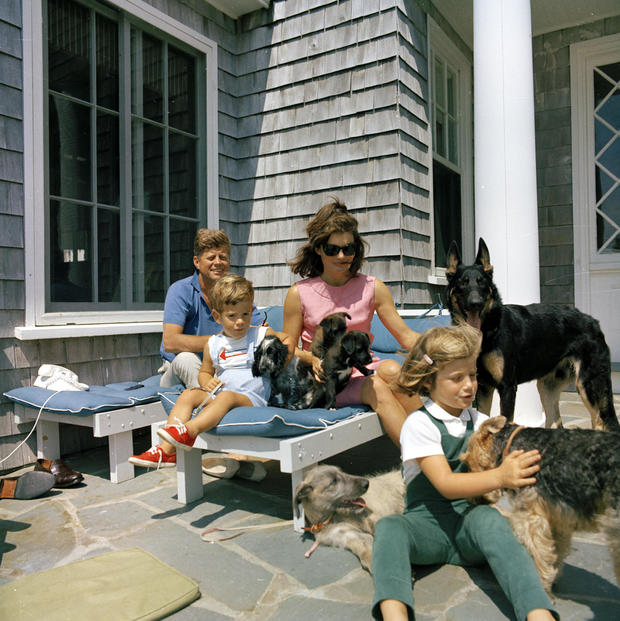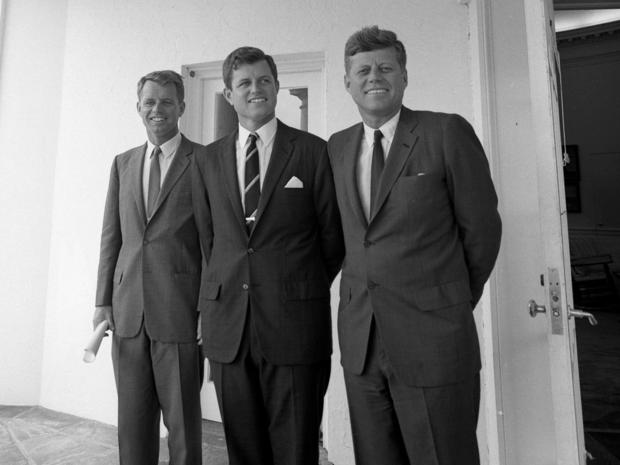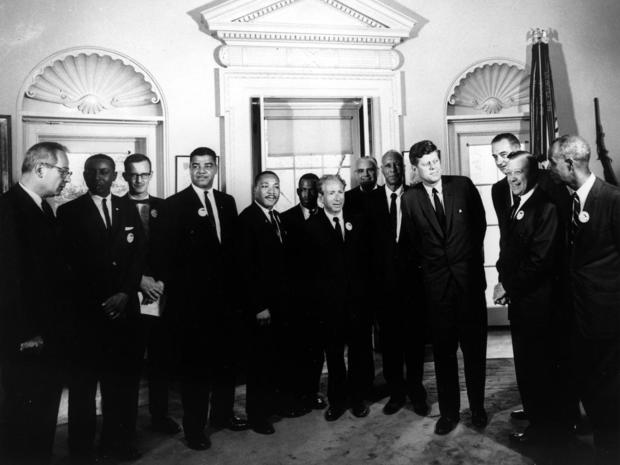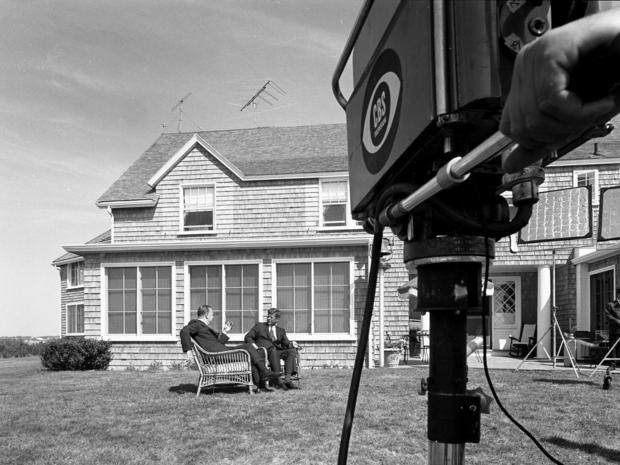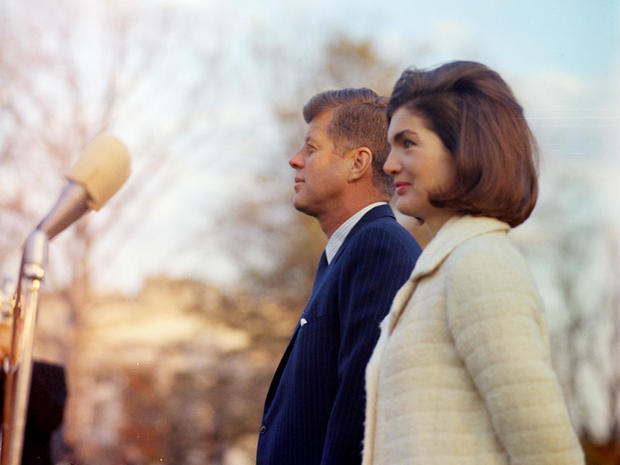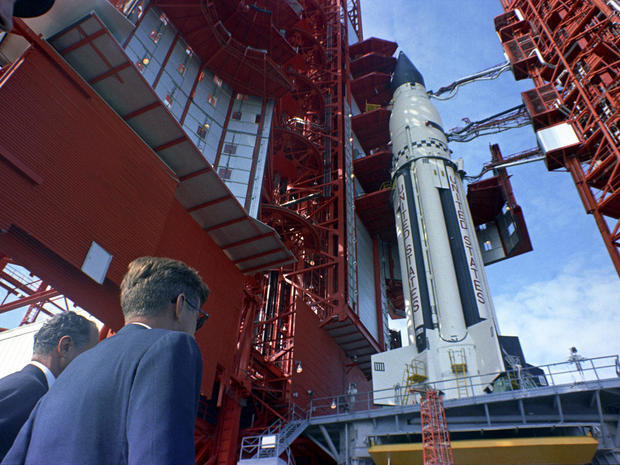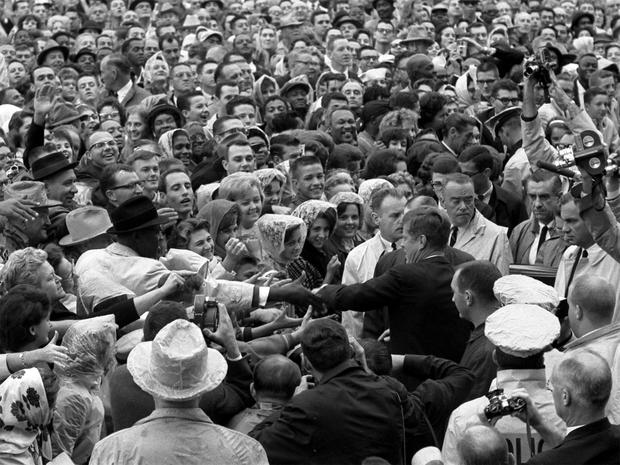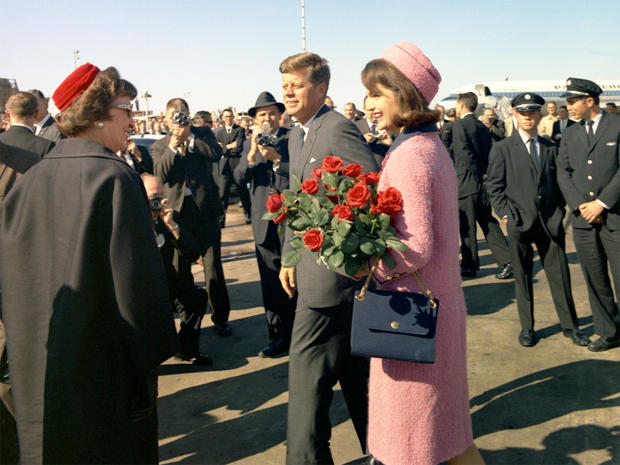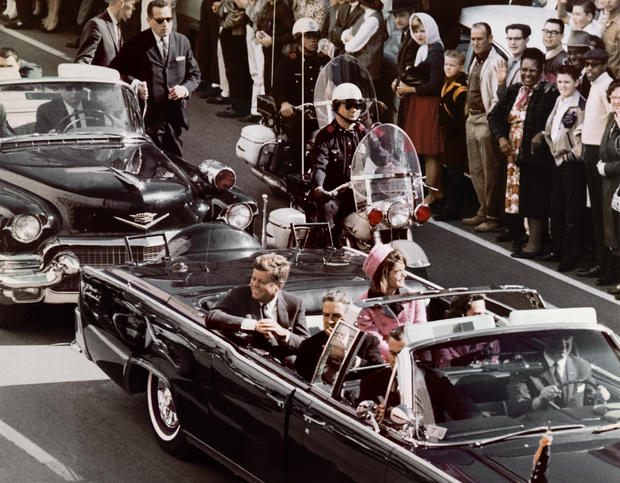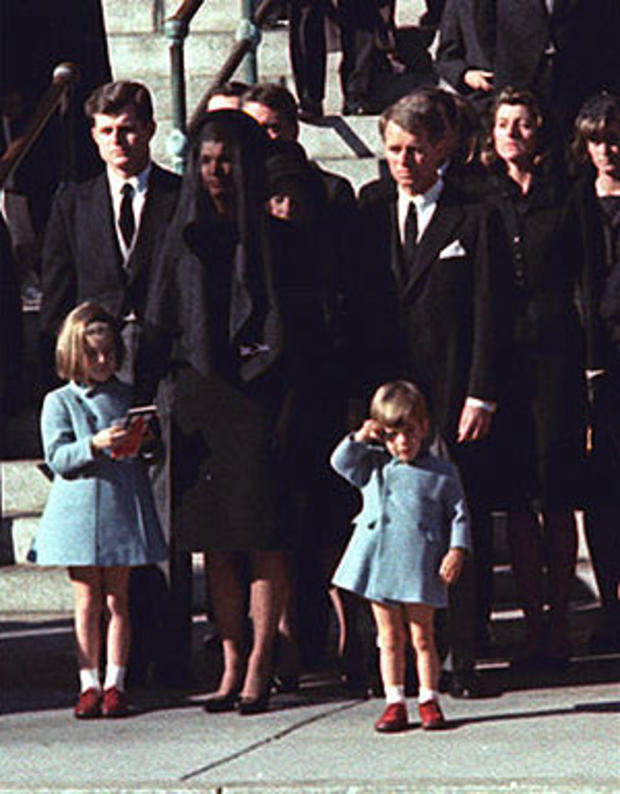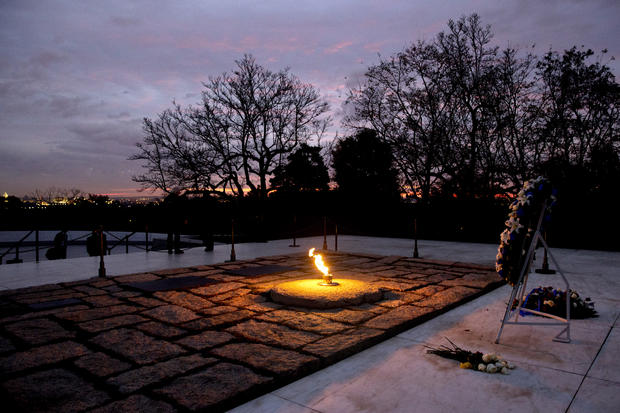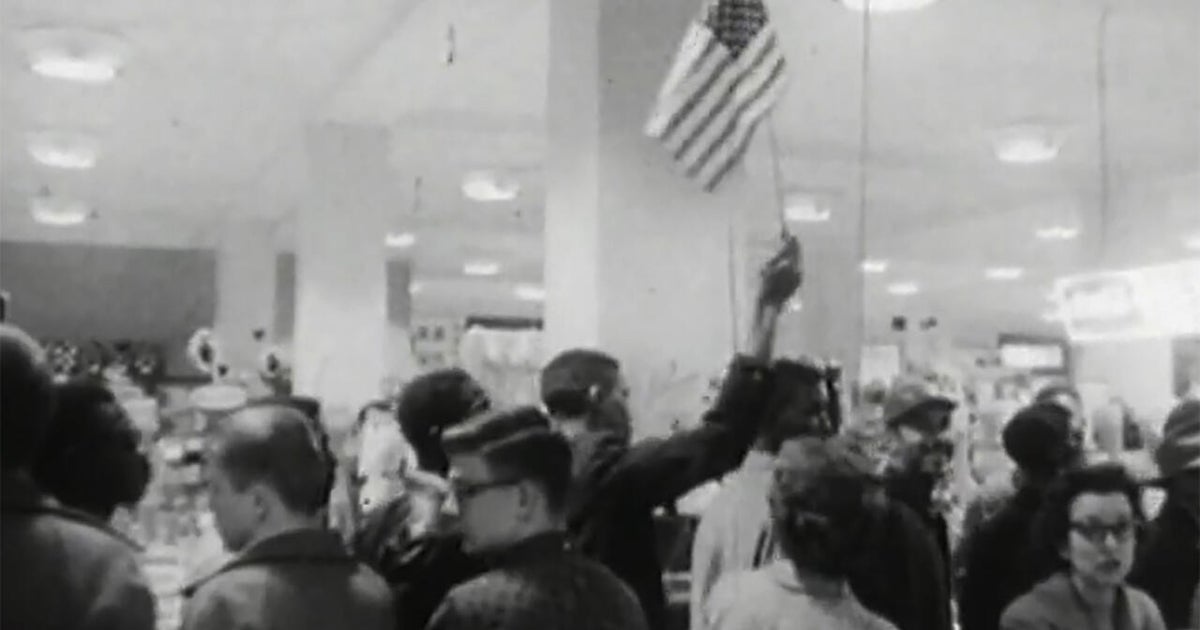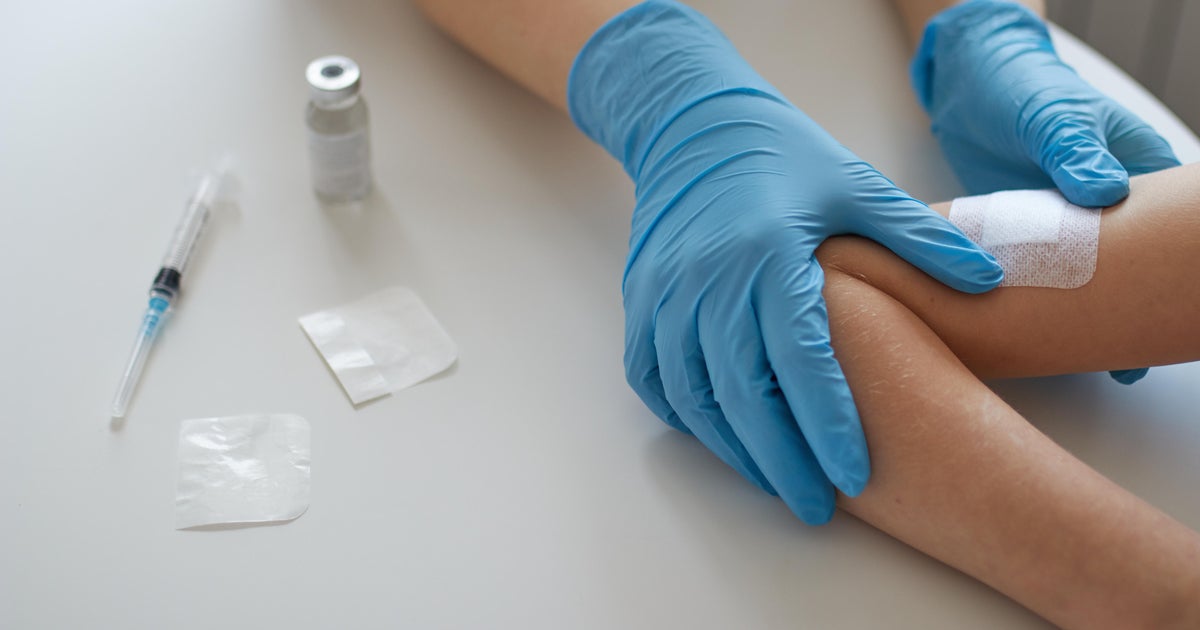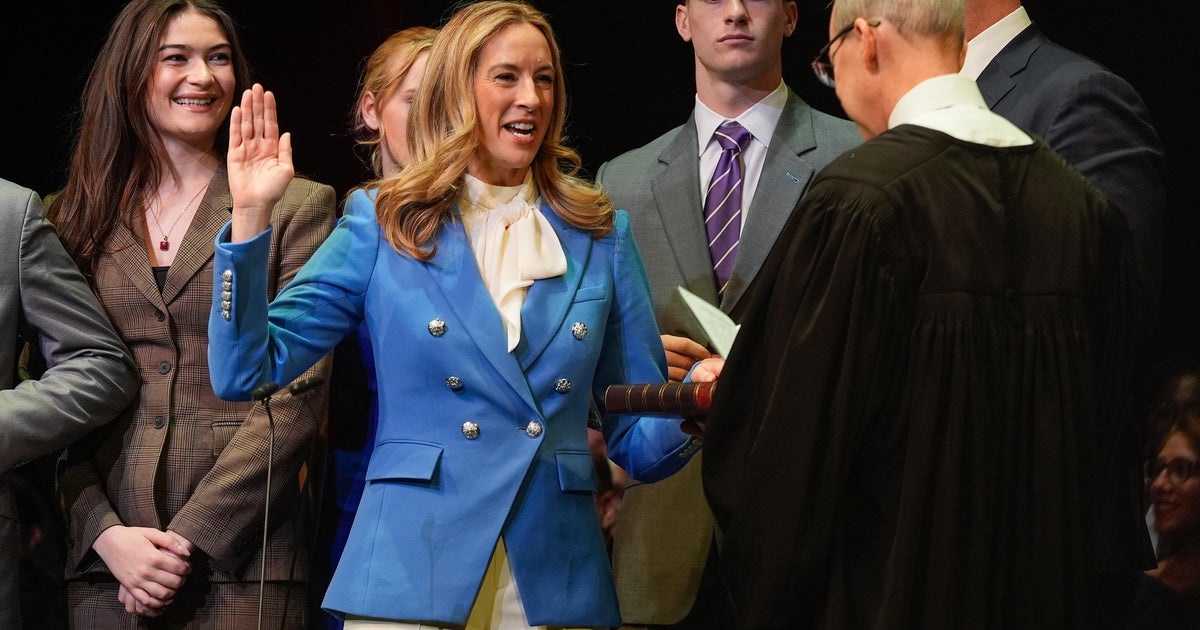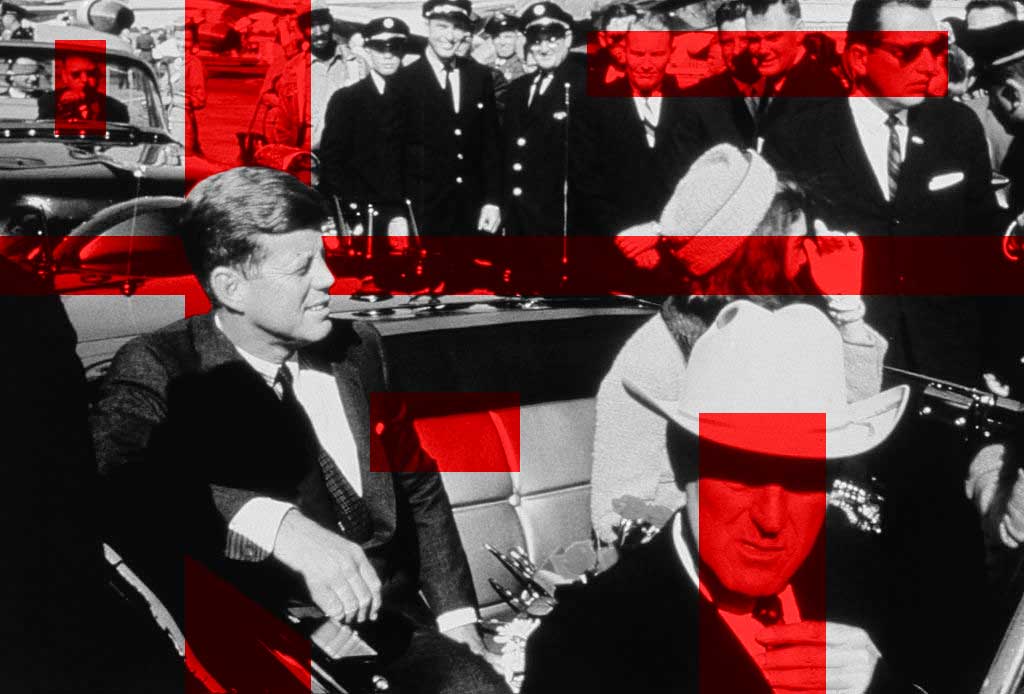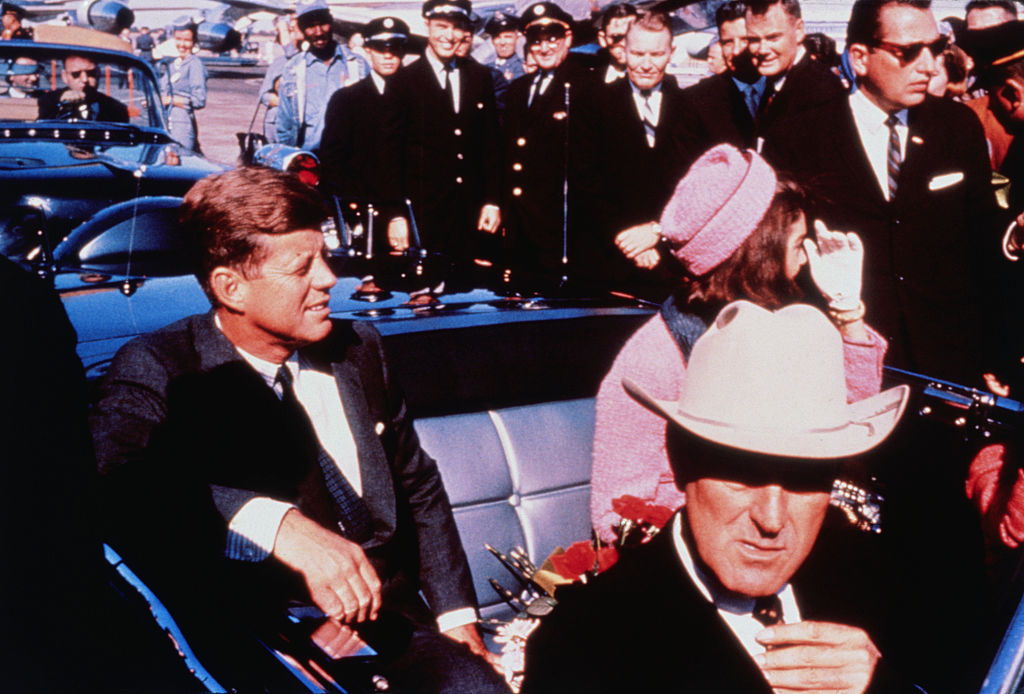JFK at 100
President John F. Kennedy at a news conference at the State Department Auditorium, Washington, D.C., November 20, 1962.
A war hero, member of an influential political dynasty, and one of the most charismatic figures to hold the nation's highest office, the 35th President of the United States represented a new generation in American political life at a tumultuous period in the nation's history.
By CBSNews.com senior producer David Morgan
Jack at 8
John Fitzgerald Kennedy was born on May 29, 1917 in Boston, the second-oldest son of businessman Joseph P. Kennedy and Rose Fitzgerald Kennedy.
Pictured: John with his dog, Bobby, at Hyannis Port, Mass., in 1925.
Siblings
From left: Joseph Kennedy Jr., Kathleen Kennedy, Rosemary Kennedy and John F. Kennedy in Cohasset, Mass.
Portrait
A portrait of John F. Kennedy c. 1926-27.
Kennedy Family
The Kennedy Family at Hyannis Port, September 4, 1931. From left: Robert Kennedy, John F. Kennedy, Eunice Kennedy, Jean Kennedy (on lap of) Joseph P. Kennedy Sr., Rose Fitzgerald Kennedy (behind) Patricia Kennedy, Kathleen Kennedy, Joseph P. Kennedy Jr. (behind) Rosemary Kennedy. The dog is Buddy.
Runner
John F. Kennedy poses for a photograph c. 1934.
Choate
Kennedy attended the Choate boarding school in Wallingford, Conn., graduating in 1935, and moving on to Harvard.
Portraits
John F. Kennedy poses for portraits c. 1935.
Harvard
John Kennedy is pictured during his Harvard swim team practice, March 10, 1938.
Father and Sons
U.S. Ambassador to Great Britain Joseph P. Kennedy is flanked by his sons, Joseph P. Kennedy Jr., left, and John F. Kennedy, aboard an ocean liner in 1938.
Joseph Jr., the eldest of the Kennedy children, who was being groomed for political office by his father, was killed during World War II when his aircraft exploded near the North Sea coast of England on August 12, 1944.
Navy
Lt. John F. Kennedy in 1942.
World War II
Lt. John F. Kennedy, commander of PT-109 in the South Pacific, 1943.
On Aug 2, 1943, while on patrol near Kolombangara Island on a moonless night, Kennedy's boat was rammed by a Japanese destroyer and cut in two. Two crewmembers were killed. Towing an injured crewmember, Kennedy swam with the other survivors for four hours to reach a nearby island. He then swam to other nearby islands in search of aid. A message carved into a coconut and passed to a native in a canoe led to the rescue of the 11 sailors after 11 days. Kennedy was awarded the Navy and Marine Corps Medal and the Purple Heart.
World War II
John F. Kennedy at Palm Beach in 1944.
White House
President Harry S. Truman receives an invitation at the White House, May 17, 1946, to attend the annual encampment of the Veterans of Foreign Wars in Boston scheduled for September. From left: John A. Breen and John F. Kennedy, both of Boston; Rep. John McCormack (D-Mass.); President Truman; Sen. Leverett Saltonstall (R-Mass.); Joseph M. Stack, VFW commander-in-chief; Eugene B. Carver Jr., Boston president of the encampment corporation, and J.J. Spurrier, Bluefield, West Virginia aide to Stack.
Running for Congress
After Rep. James Curley vacated his seat to run for Mayor of Boston in 1946, John F. Kennedy - who had worked as a reporter for Hearst newspapers - campaigned for Congress. He came out on top in the Democratic primary, and handily defeated his Republican opponent in the heavily Democratic district.
The Distinguished Gentleman
Rep. John F. Kennedy, D-Mass., looks through real estate ads on Capitol Hill in Washington, D.C., on November 27, 1946.
Campaign
In 1952 the Massachusetts Representative defeated the sitting Republican Senator, Henry Cabot Lodge Jr.
Marriage
Jacqueline Bouvier and John F. Kennedy were married on September 12, 1953, at St. Mary's Church in Newport, Rhode Island, followed by a reception attended by 1,200 at Hammersmith Farm.
Portrait
A July 26, 1956 photo of Sen. John F. Kennedy, D-Mass., at his office in Washington.
Bobby and Jack
Robert F. Kennedy and John F. Kennedy during the McClellan Senate hearings in 1957.
Robert Kennedy, a Justice Department lawyer, managed his brother's successful campaign for the Senate, before working as an assistant counsel to the Senate committee chaired by Joe McCarthy. He later worked as an aide on Adlai Stevenson's 1956 presidential campaign, and chief counsel of the Senate's Labor Rackets Committee.
Caroline
Senator John F. Kennedy and his wife, Jacqueline, with their infant daughter Caroline after her christening ceremony at St. Patrick's Cathedral in New York City on Dec. 13, 1957. At right is Boston's Archbishop Richard Cushing, who performed the baptism ceremony.
Mr. President
Sen. John F. Kennedy, of Massachusetts, greets President Dwight D. Eisenhower at the National Corn Picking Contest near Cedar Rapids, Iowa, Oct. 17, 1958.
Portrait
Sen. John F. Kennedy, D-Mass., is shown in his office in Washington, D.C., Feb. 27, 1959.
U.S. Senate
Robert Kennedy, left, counsel to the Senate Rackets Committee, confers with his brother, Sen. John Kennedy, D-MA, a committee member, during a hearing on the Teamsters Union affairs, July 8, 1959.
Eleanor Roosevelt
Sen. John F. Kennedy (D-Mass.), who announced his candidacy for the Democratic presidential nomination, chats with former first lady Eleanor Roosevelt before participating in a videotape recording of a panel discussion at Brandeis University in Waltham, Mass., Jan. 2, 1960.
Monitor
Sen. John F. Kennedy watches a playback of his televised appearance in Milwaukee, Wis., April 3, 1960.
Campaign
Senator John F. Kennedy, D-Mass., stands on a platform as he shakes hands with a crowd of people that greeted him at Westview shopping center in Baltimore, Md., May 13, 1960.
Campaign
Sen. John F. Kennedy makes his way through a crowd of supporters and journalists as he arrives in Los Angeles, July 9, 1960 for the Democratic National Convention.
Kennedy (who won 10 primaries) faced competition for the Democratic nomination from Texas Senator Lyndon B. Johnson, Minn. Senator Hubert Humphrey, Missouri Senator Stuart Symington, New Jersey Governor Robert Meyner, and former nominee Adlai Stevenson.
Jack and Bobby
Massachusetts Sen. John F. Kennedy compares notes with his brother and campaign manager, Robert Kennedy, on July 10, 1960.
In his book "The Road to Camelot," co-author Tom Oliphant wrote that the Kennedys initially rejected Lyndon Johnson as a vice presidential nominee, falsely assuming that Johnson didn't want the Veep spot. But when JFK suddenly realized Johnson (who had campaigned for president himself) was in fact lusting for the job, he and his brother tried (and failed) to find a way to placate the powerful Texan if they didn't pick him. As Bob Kennedy ruefully put it, "We came up with the idea of trying to get rid of him … and it didn't work."
Running Mate
The Democratic presidential ticket - Sen. John F. Kennedy and his running mate, Sen. Lyndon B. Johnson - pose together July 14, 1960 in the convention headquarters hotel in Los Angeles.
Democratic National Convention
Sen. John F. Kennedy addresses the Democratic Party Convention delegates and others at the Los Angeles Coliseum, July 15, 1960. "The New Frontier is here whether we seek it or not," he said. "Beyond that frontier are uncharted areas of science and space, unsolved problems of peace and war, unconquered problems of ignorance and prejudice, unanswered questions of poverty and surplus. It would be easier to shrink from that new frontier, to look to the safe mediocrity of the past, to be lulled by good intentions and high rhetoric ... But I believe that the times require imagination and courage and perseverance.
"I'm asking each of you to be pioneers towards that New Frontier. My call is to the young in heart, regardless of age; to the stout in spirit, regardless of Party; to all who respond to the scriptural call: 'Be strong and of a good courage; be not afraid, neither be [thou] dismayed.'"
Campaign
Sen. John F. Kennedy, the Democratic presidential nominee, bends over to talk to three of his nephews just before they board a plane in Los Angeles on July 17, 1960, on their way home to Massachusetts. Fro left: Bobby Shriver, son of Kennedy's sister, Mrs. R. Sargeant Shriver; and Bobby and Joe Kennedy, sons of Robert Kennedy.
Sailing
Sen. John F. Kennedy and Jacqueline Kennedy relax aboard the family yacht, Marlin, before sailing around Nantucket sound at Hyannis Port, Mass., on July 19, 1960.
Democrats
Senators Lyndon Baines Johnson and John F. Kennedy, the Democratic Party's presidential ticket, address journalists at a joint press conference from the Kennedy home, July 30, 1960, at Hyannis Port, Mass.
Campaign
An Ohio crowd greets Senator John F. Kennedy after his campaign speech, Oct. 17, 1960.
Hyannis Port
Sen. John F. Kennedy, D-Mass., sits with his wife, Jacqueline, as she reads to their daughter, Caroline, at Hyannis Port, Mass., July 25, 1960.
Nixon and Kennedy Debate
A view from the control room as Richard M. Nixon, right, listens to John F. Kennedy speak during the first-ever televised Presidential debate, in Chicago, September 26, 1960. Debate moderator Howard K. Smith sits between them.
Election Night
Sen. John Fitzgerald Kennedy and his wife Jacqueline address supporters on Nov. 8, 1960. In one of the closest election races in history, Kennedy defeated Vice President Richard Nixon by a margin of about 112,000 votes.
At 43, Kennedy - the first U.S. president to have been born in the 20th century - became the youngest man ever elected to the office, and the first Roman Catholic.
Inauguration
President John F. Kennedy delivers his inaugural address, January 20, 1961.
"Let the word go forth from this time and place, to friend and foe alike, that the torch has been passed to a new generation of Americans - born in this century, tempered by war, disciplined by a hard and bitter peace, proud of our ancient heritage - and unwilling to witness or permit the slow undoing of those human rights to which this nation has always been committed, and to which we are committed today at home and around the world."
U.S.S.R.
Soviet Chairman Nikita Khrushchev greets President John F. Kennedy at the Soviet Embassy in Vienna, Austria. in June 1961.
State Dinner
President John F. Kennedy and Pakistani President Mohammad Ayub Khan, with Khan's daughter, Begum Nasir Akhtar Aurangzeb, and first lady Jacqueline Kennedy, attend a state dinner in Khan's honor at Mt. Vernon, Virginia, July 11, 1961.
Peace Corps
President Kennedy meets with more than 600 Peace Corps trainees preparing for overseas assignments on the South Lawn of the White House, August 9, 1962.
The President welcomed the trainees who had, he said, "committed themselves to a great adventure," and hoped they would return to careers of service in the government.
Sailing
President Kennedy sails aboard the U.S. Coast Guard yacht Manitou off the coast of Maine, August 11, 1962.
Hyannis Port
President Kennedy drives his nieces and nephews in a golf cart at Hyannis Port, September 3, 1962.
America's Cup
President John F. Kennedy, aboard the destroyer USS Joseph P. Kennedy Jr., salutes the sloop Weatherly after its win in the America's Cup Race off Newport, R.I., September 15, 1962.
Oval Office
President Kennedy with Caroline Kennedy and John F. Kennedy, Jr. in the Oval Office, October 10, 1962.
Cuban Missile Crisis
On October 14, 1962, a U-2 spy plane photographed medium-range ballistic missiles from the Soviet Union being installed in Cuba - within range of cities along the U.S. East Coast. Despite denials from Moscow, the U.S. prepared for a possible invasion. Then, further reconnaissance flights spotted short-range missiles capable of carrying nuclear warheads, which could have quickly escalated any Cuban defense against an invasion into full-out nuclear war between the U.S. and the U.S.S.R.
President Kennedy announced a blockade of Cuba. Here, he signs the Cuba Quarantine Proclamation in the Oval Office, October 23, 1962.
National Security Council
Tensions escalated further on October 27, 1962, when a U-2 plane was shot down over Cuba. Its pilot, USAF Major Rudolf Anderson, was killed.
Pictured: Meeting of the Executive Committee of the National Security Council (EXCOMM) at the White House Cabinet Room, October 29, 1962. Clockwise from President Kennedy: Robert McNamara, Roswell Gilpatric, General Maxwell Taylor, Paul Nitze, Donald Wilson, Ted Sorensen, McGeorge Bundy (hidden), Douglas Dillon, Vice President Lyndon Baines Johnson (hidden), Robert F. Kennedy, Llewellyn Thompson, William C. Foster, John McCone (hidden), George Ball, and Dean Rusk.
Cuba
President Kennedy confers with Secretary of Defense McNamara at the culmination of the Cuban Missile Crisis, October 29, 1962.
The 13-day crisis ended when Soviet Premier Nikita Khrushchev announced he would withdraw the missiles in return for a U.S. promise never to invade Cuba. Khrushchev's words to his military, as preserved at the U.S. National Archives: "Remove them. As quickly as possible. Before something terrible happens."
The crisis would prompt the creation of a direct Washington-to-Moscow hotline.
State Dinner
President John F. Kennedy, first lady Jackie Kennedy, Grand Duchess Charlotte of Luxembourg, and Grand Duke of Luxembourg Prince Jean approach the stage at the State Dinner in honor of the Grand Duchess, April 30, 1963. Basil Rathbone gave Elizabethan readings and the Consort Players of New York played music in the East Room.
Desegregation
President Kennedy is pictured in the Oval Office addressing the nation on the desegregation of the University of Alabama, after National Guardsmen ensured two African American students were granted admission to the school, June 11, 1963.
"One hundred years of delay have passed since President Lincoln freed the slaves, yet their heirs, their grandsons, are not fully free," he said. "They are not yet freed from the bonds of injustice. They are not yet freed from social and economic oppression. And this Nation, for all its hopes and all its boasts, will not be fully free until all its citizens are free."
Germany
President John F. Kennedy takes a walk around "Checkpoint Charlie" during his visit to Berlin, June 26, 1963.
Germany
President Kennedy addresses a crowd gathered at the Rudolph Wilde Platz in Berlin, Germany, June 26, 1963.
Germany
"Two thousand years ago, the proudest boast was civis romanus sum - 'I am a Roman citizen,'" Kennedy said. "Today, in the world of freedom, the proudest boast is Ich bin ein Berliner!"
Native Son
President John F. Kennedy rides a motorcade through the city of Cork, Ireland, June 28, 1963.
Hyannis Port
President John F. Kennedy Jr., with Jacqueline and Caroline and the family dogs, at Hyannis Port, August 14, 1963.
Siblings
President John F. Kennedy stands with his brothers, Senator Edward M. Kennedy and Attorney General Robert F. Kennedy, outside the Oval Office, August 28, 1963.
March on Washington
President Kennedy and administration officials meet with leaders of the March on Washington, August 28, 1963. From left: Secretary of Labor Willard Wirtz, Floyd McKissick, Matthew Ahmann, Whitney Young, Rev. Dr. Martin Luther King, Jr., John Lewis, Rabbi Joachim Prinz, Rev. Eugene Carson Blake, A. Philip Randolph, President Kennedy, Vice President Johnson, Walter Ruether, and Roy Wilkins.
Interview
President John F. Kennedy is interviewed by CBS Newsman Walter Cronkite at Hyannis Port, Mass., September 2, 1963, which was featured in the first "CBS Evening News" broadcast after the show was expanded from 15 minutes to a half-hour.
When asked about the growing war in Vietnam, Kennedy said, "In the final analysis, it's their war. They're the ones who have to win it or lose it. We can help them. We can give them equipment. We can send our men out there as advisers. But they have to win it - the people of Vietnam - against the Communists."
Jack and Jackie
President John F. Kennedy and First Lady Jacqueline Kennedy stand side-by-side before the performance of the Black Watch Band and Pipers, November 13, 1963.
Cape Canaveral
Senator George Smathers, of Florida, and President John F. Kennedy are pictured at Cape Canaveral's Pad B, Complex 37, where they were briefed on the Saturn rocket by Dr. Werner Von Braun, November 16, 1963.
Fort Worth
President John F. Kennedy greets the crowd in Fort Worth, Texas, November 22, 1963, before embarking on a short flight to Love Field in Dallas.
Dallas
President and Mrs. Kennedy arrive at Love Field in Dallas, Texas, November 22, 1963.
Dallas Motorcade
President John F. Kennedy and his wife Jacqueline smile at the crowds lining their motorcade route in Dallas, Texas, on November 22, 1963, minutes before he was assassinated as his car passed through Dealey Plaza. Texas Governor John Connally was also wounded.
The president was pronounced dead shortly after being wheeled into the trauma room at Parkland Memorial Hospital.
Salute
John F. Kennedy Jr. salutes his father's casket outside St. Matthew's Cathedral in Washington, following a funeral mass, Nov. 25, 1963. Standing behind "John-John" from left are his sister, Caroline; Edward Kennedy; Jacqueline Kennedy; and Robert Kennedy.
Arlington National Cemetery
The eternal flame flickers in the early morning light at the grave of John F. Kennedy at Arlington National Cemetery on the 50th anniversary of Kennedy's death, Nov. 22, 2013.
For more info:
